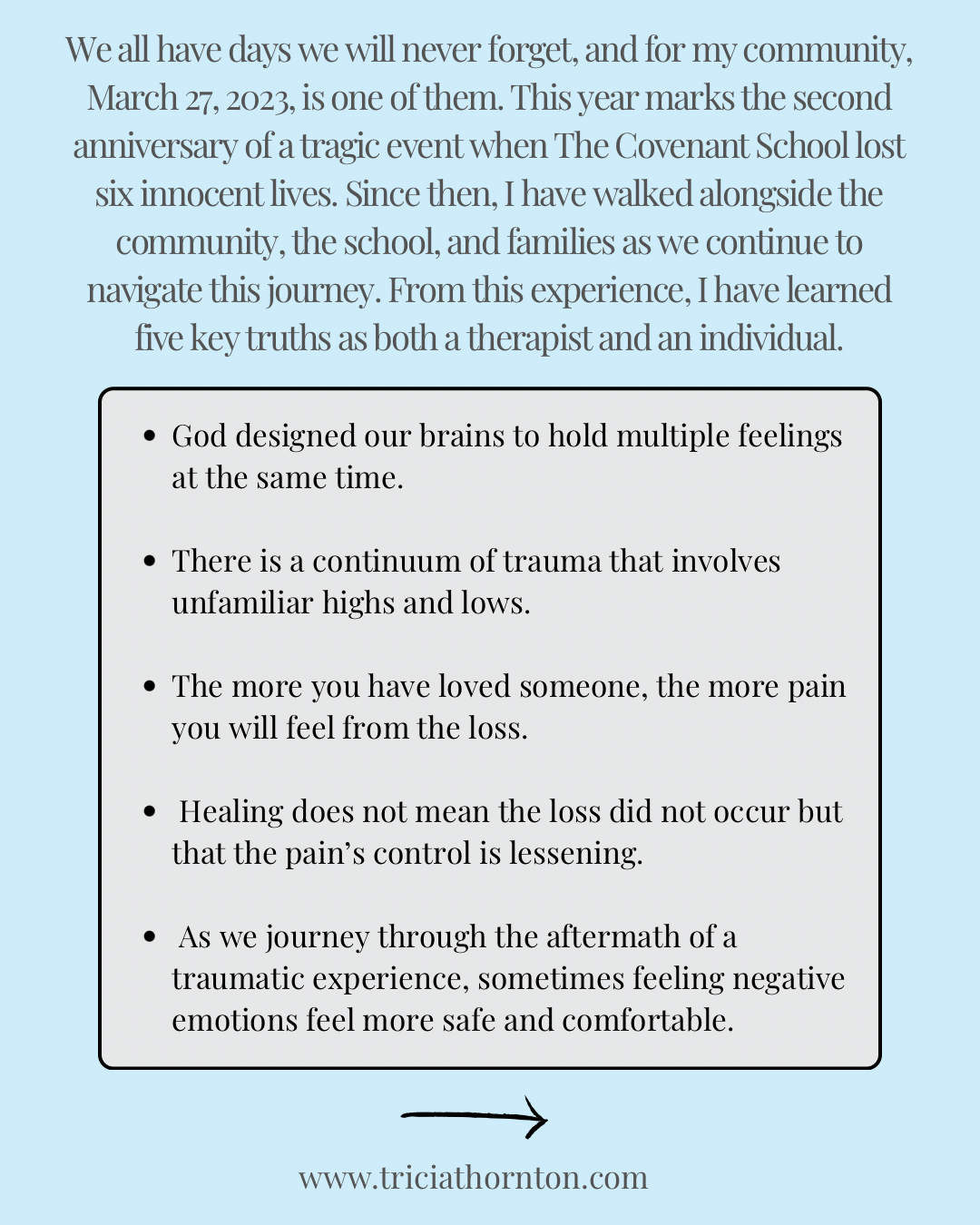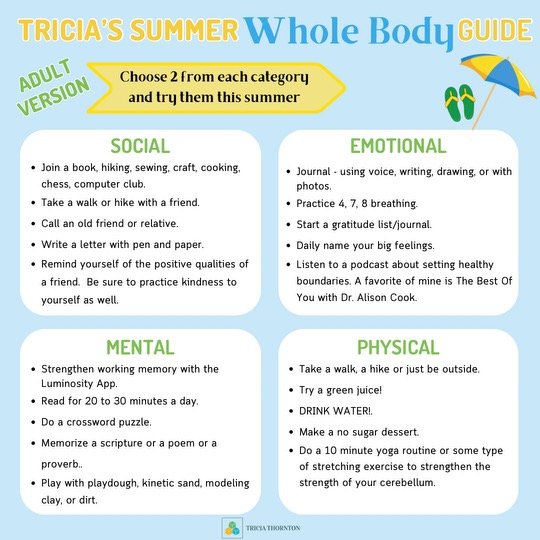
Five Key Truths: What I Have Learned After a Trauma
We all have difficult and tragic days or seasons we will never forget whether globally, nationally, or in our own families.
What are yours?
The assassination of JFK?
9/11
The loss of a loved one?
A particular natural disaster?
A relationship ending?
A loss of a job?
A broken promise?
A loss of safety?
One I will never forget is March 27, 2023 when tragedy struck The Covenant School. Through walking alongside families, the community, and the school, I have come to believe 5 key truths:

Ending the Anxiety Cycle: Supporting Your Child with Anxiety While Managing Your Own
Each week, in my private practice I hear parents discuss that they are feeling buried under growing worries about their children, their jobs, their relationships, and their mental health. There is no doubt we as a world are experiencing a collective dark night of the soul. One of the hardest questions, yet very often ones I hear is, “What can I do?” The following answer is usually met with some type of deep breath and even a sigh, “We must journey together to look inward and name the hard feelings first.”



Filling a Parent Toolbox for an Emotionally Successful School Year
It is all the buzz, a new school year is upon us. With the start of school, comes many different feelings and emotions not only for children but for parents as well.

Enjoying the Holidays with Preparation
The summer is full of fun and exciting celebrations. Preparation is the key to enjoying the holidays with the whole family.

Tricia’s Summer Whole Body Guide
Summer can be an invitation to trying something new! What if by the fall, you and your child would have grown socially, emotionally, mentally, and physically. This guide is meant to be a starting place. Choose a couple ideas from each category and give them a try!

How to Tame the End-of-the-School-Year Blues
I am a mom of two daughters who grew up watching High School Musical on replay. A favorite scene occurs in the second movie when the the wall clock is ticking down. The bell rings. All the children jump up and run for the doors because summer has begun! The movie shows all the happy faces and the elated students jumping up and down with joy for the start of summer break. What the movie does not show is the angst and the bigger feelings that arise when a change occurs like the end of a school year. Can our brains hold multiple feelings at the same time? Can our children be excited for summer break and sad to leave their teachers and routines? The answer is yes!

Resources to Help Children and Caregivers When the News is Scary
Here is a collection of articles and books to use when you are trying to help a child when the news all around them is quite scary and uncertain.

Shepherding is Not All Green Pastures: Five Ways to Maintain Strength as a Parent
Have you ever wondered what it is like to be a shepherd in fields of green pastures? A few years ago I became interested in more about the job as a shepherd. I did some research and found some fascinating similarities between shepherding and parenting.

8 Ways Anxiety Shows Up
Anxiety shows up in 8 ways. It does not always look like a ball of nerves.



Hula Hoop Boundaries: Learning to Keep your Power Within Your Hoop
It is a learned skill that most of us had to practice often to even have a chance to keep the hoop up. Well, guess what, hula hoop boundaries are the same! They take lots of practice to be able to understand the art of keeping your hula hoop in place around you at all times.


Perseverance: The How, What, When, Where, and Why?
I have said before that I think and learn a lot with acronyms. My brain must think that way, because they come to me fairly easy. When I was hiking the other day, I was going over what I wanted my monthly focus to be for July. The word perseverance kept coming to me, so I have decided that is it! I will be focusing on the how, what, when, where, and why of perseverance.

Perfectionism: Recognizing the Fear Behind it and Stepping into Freedom.
Do you know the most important way to recognize counterfeit currency? It is to study and know the details of genuine currency. When I first heard this question this morning while listening to a sermon, I was a bit stumped. I did think of studying the real money, but I also thought that it would be smart to study the ins and outs of the fake money as well. The more I sat with the question, the more I realized that examining the genuine would allow you to recognize the counterfeit much quicker and with more accuracy. So, how does this idea relate to perfectionism?

Home: How is Attachment and Home Related?
Home. This simple four-lettered word is not exactly simple. T.S. Eliot (1970) suggested, "Home is where one starts from." Home encompasses more than a physical location. Being "at home" refers to an emotional state and a sense of belonging. This word can conjure up many thoughts, memories, feelings, images, and emotions.

Self-Care: Is It a Trend or Is It Here to Stay?
There has been a lot of talk lately about self-care; it is almost as if taking care of oneself has become trendy. Sometimes trends come and go and some stick around for a while. In fashion, women thought that animal print would eventually go out of style, but leopard prints, are still draping the runways. Will self-care stick around? Why has it become so on trend? What exactly does it mean to take care of yourself? What are the benefits of self-care?

The Magic of B's: How to Be Bold, to Believe and Be Beautiful
Bees are a vital part of our ecosystem by providing balance through their role of being chief pollinators to the flowers. Without bees, our food production cycle would go extinct. In a way, we can think of bees as holding the magic wand that sprinkles our earth with beautiful fairy dust. Over the past several years, I have been pulling together from several authors, presenters, books, and schools of thought, and my own experience to develop this idea that there is a flow of B's that all work together to produce a transformational effect.

